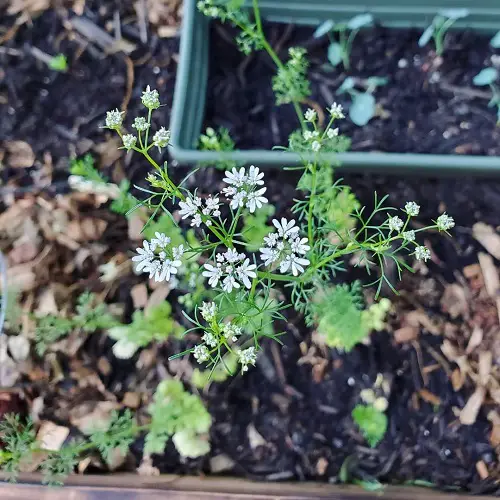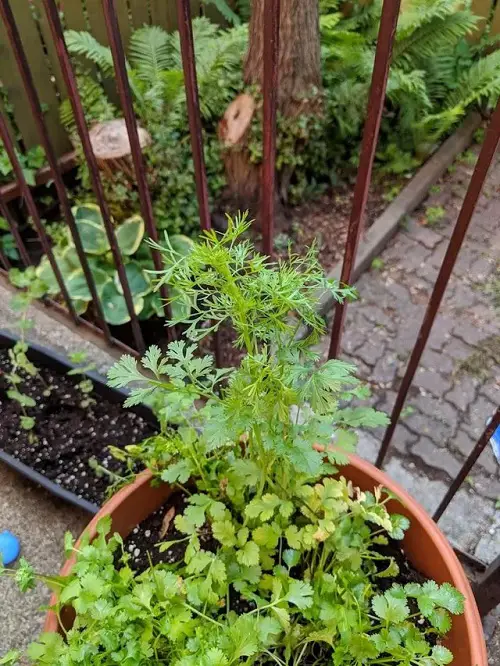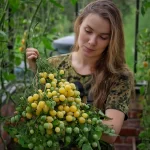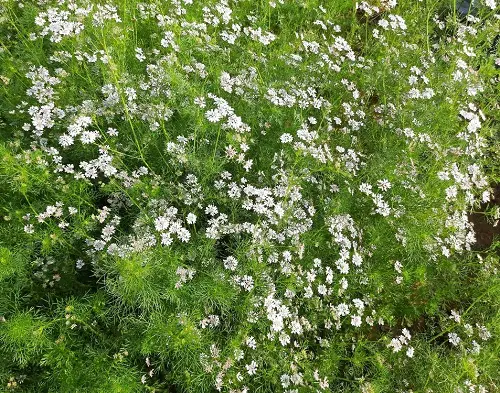Wondering What to Do with Cilantro Flowers? In this article, we will tell you how to stop Cilantro from Bolting.
Cilantro is a versatile herb that can add a unique flavor to many dishes. However, once it starts to bloom, many gardeners get confused. So, What to Do with Cilantro Flowers? How to stop Cilantro from Bolting? Let’s find out!
Check out 9 Best Cilantro Companion Plants
Why Cilantro Flowers?
Cilantro plants bolt and flower when you expose them to warm temperatures for a longer period of time, especially the afternoon sun. This is a natural process in which the plant produces flowers and seeds to ensure its survival and reproduction.
Bolting occurs when the plant begins to expend energy to produce flowers and seeds instead of leaves, resulting in a bitter taste in the leaves.
What to Do When Cilantro Flowers?

When cilantro blooms, it can be a sign that the plant has gone to seed, which means that it is no longer producing edible leaves. However, there are still a few things that you can do when cilantro flowers.
- Harvest Seeds: Once cilantro has gone to seed, you can harvest the seeds to use in cooking or to save for future planting. To harvest the seeds, wait until the flowers have dried up and the seed heads turn brown. Then, cut the stem off and remove the seed heads. The seeds can then be stored in an airtight container.
- Make Cilantro Pesto: Cilantro flowers are edible and can be used to make a delicious pesto. Simply blend the flowers with olive oil, garlic, salt, and pepper to make a flavorful sauce.
- Make a Tincture: Cilantro flowers can also be used to make a powerful herbal tincture. To make a tincture, steep the flowers in vodka or other high-proof alcohol for 2-3 weeks. Strain out the flowers and store the tincture in a dark bottle.
- Eat the Flowers: The flowers themselves are edible and can be used to add a unique flavor to dishes. They can be eaten raw or cooked to add flavor to salads, sauces, and other dishes.
Find How to Grow Cilantro from Stem Cuttings of Grocery Store Bunch
How to Keep Cilantro from Bolting?

It’s important to realize that preventing cilantro from bolting completely is impossible, as it is inherent in the plant’s nature to reproduce. However, there are several strategies that can substantially delay the flowering process and prolong the cilantro plant’s lifespan.
- Cilantro is an annual herb, which means it will bolt (flower and go to seed quickly) if it gets too hot. Plant it in the early spring, when temperatures are still cool, or in the late summer, when temperatures are beginning to cool down.
- Cilantro needs at least six hours of direct sunlight daily to thrive. Plant it in an area with plenty of sunlight, and it will be less likely to bolt.
- Bolting can be caused by the soil drying out. Make sure to water your cilantro regularly and keep the soil moist.
- Planting it in containers will allow you to move it if temperatures become too hot.
- Pruning your cilantro will encourage leaf growth instead of flowering. Prune off any flower buds that appear.
- As soon as you see flower stalks starting to form, cut them off. This will help keep the plant from bolting and flowering.
- Make sure to water your cilantro plants regularly. This will help keep them from bolting and flowering.
- Plant cilantro in a partially shaded location. This will help keep the temperature lower and prevent bolting. Cilantro requires only four to six hours of sunlight to thrive; it doesn’t necessarily need full sun exposure.
- Crowded plants are more likely to bolt.
- This will encourage the plant to keep producing new leaves instead of bolting.



